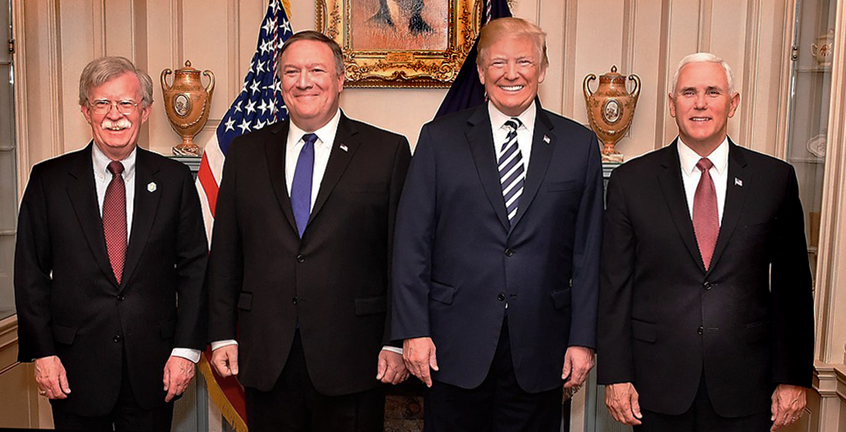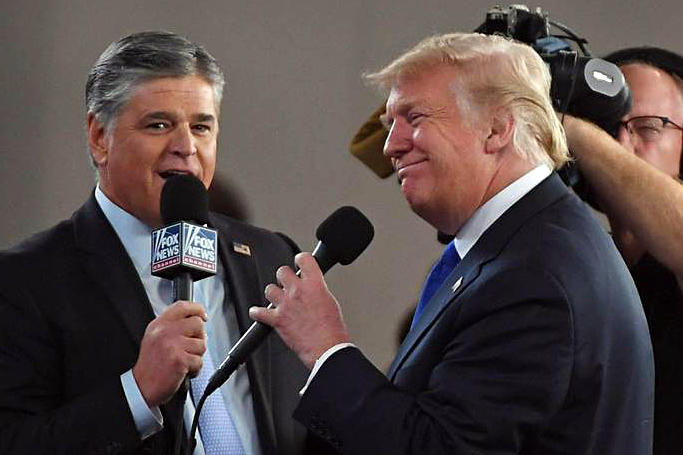Ultimately we are dealing with the doctrine of submission. That does cast Trump in the role of God Emperor Trump and so be it. What needs to end is the doctrine of National competition itself in order to replace it with the more natural doctrine of National Cooperation. This has been missing from Islam and Communism as well.
We live in a world in which real USA military power is deeply disguised in order to not promote a desperate scramble driven by real fear. Best is that we do not know this. Press releases to the contrary, recall that at the outset of the 1990 Gulf War, that the Iraqi army disappeared into the casualty list of 100,000. All military doctrine had them dug in at the front. So what happened to them?
We certainly had scant casualties afterward on either side except for the slaughter of escaping rear element Iraqis from Kuwait City which likely claimed a couple of thousand.
Throw in kinetic torpedoes from earth orbit and there is no such thing as a hardened facility anywhere that is safe. China had a demo last year. They can easily imagine the fate of their massive military complex out in the desert..
This last round of Kabuki Theater allowed Trump off the hook for responding to an Iranian Threat while allowing him to tighten the screws without looking weak. Cute.
There is so much we do not see and we still must trust the players and so far so good. It is also much scarier than we know and also much safer than we know which is radically different from the alternative which was a deliberate drift into a major war.
There is so much we do not see and we still must trust the players and so far so good. It is also much scarier than we know and also much safer than we know which is radically different from the alternative which was a deliberate drift into a major war.
..
Trump to World: Accept You're a Loser and We Can Be Friends
Genius President Plays with Fire
Posted on June 24, 2019 by John Grant
https://thiscantbehappening.net/genius-president-plays-with-fire/
Did President Donald Trump go soft at the last minute and decide the 150 Iranian souls expected to die in an attack that was “10 minutes away” should live? We’re told the planes were in the air when he had his magnanimous, humanitarian moment. It reminds me of the story told by Fyodor Dostoevsky about being in front of a firing squad as a young man, ready to die – when at the very last moment, a messenger arrives: “The Czar has commuted your sentence and given you life. All praise to the Czar! Say thank you and get on the cattle train for Siberia.”

[ The Crush-Iran Team. Who’s on first? ]
It may be an odd analogy, but what connects these two stories is the inner life of Donald Trump, a mind-space we’re doomed to imagine, a space where the man is in a toga seated on a golden throne just loving his power to give a thumbs up or a thumbs down on the lives of others. Nero was also a celebrity emperor; his talent was poetry and playing the lyre, not strutting around for the cameras and acting mean, firing people. Mr. Trump tells us he’s sticking with his earlier position that the innocent Central Park Five be executed; maybe he could get a pardoned SEAL team killer to do extra-legal executions, then keep pardoning the operative while declaring “executive immunity.” A woman advice columnist now tells us how he violently pressed her up against the wall in an elite department store dressing room and crudely shoved his little donald into her private parts. Smooth. The woman has broken with the #MeToo trend and says, “It was all my fault.” Sorta like the American people who elected Donald Trump and will, little doubt, at some point feel his arrogance shoved deep into the sad delusions of their lives. Like the last line in Jimmy Buffet’s “Margaritaville”: “It was our own damn fault.”
Given the president’s immense capacity for lying and dishonesty, no one should believe a word of his tale of magnanimous commutation. The more plausible story is that, when faced with the downing of a $130 million drone (which was probably in Iranian airspace when shot down) the master of making bankruptcy and chaos smell like a bed of roses in his gold-lined bedroom, got together with his team of chicken-hawk warmongers and called up the Pentagon (whose acting civilian leader just resigned) and ordered a tough-guy raid to show the USA is not to be trifled with.
In this scenario, the duo of John Bolton and Mike Pompeo are giddy with visions of regime change by Christmas. I imagine a cluster of nervous generals led by Joint Chiefs boss General Dunford trekking over to The Situation Room and saying:
“Mister President, do you understand what you have just ordered? Do you understand that such a raid will mean 150 dead Iranians, maybe more, including civilians? Do you understand that if you do this, the Iranians will respond somewhere in the world by activating one of their already established contingency plans, which, this time, will mean a lethal attack we will have to respond against in an escalated manner? Do you realize that means this raid will lead to war with Iran? A war which could easily escalate to include other actors. Mister President, do you understand what we’re saying?”
“Of course I understand. I’m a genius!” He waves at a servant. “Bring me a Diet Coke!”
“Sir, maybe we could attack a target with no casualties.”
“No. I talked with Sean this morning and this is what we’re gonna do. Have the planes taken off yet?”
“They’re in the air, sir.”
The Fox hotline rings. It’s Tucker.
“Sir!” Tucker’s voice is a cross between a snake-tongued William Buckley, Jr. and a whining 13-year-old. “Sir, I think you need to reconsider the raid.”
“Huh? You think so?”
“Yessir! Don’t forget you’re the anti-Obama, the anti-Hillary. You’re against foreign interventions. Have you noticed that our recent foreign wars have ended in dismal failure for the United States? Sir, this is an opportunity to show greatness. Please don’t blow it!”
The president scratches his head, releasing a three-foot-long silken wisp of hair engineered by a team of trained scientists to cover his bald spot with a duck-tail comb-over. He glances to his left and snaps his fingers. A man in a spotless white coat and a pocket-protector full of colored pens comes over with a tube of something and a battery-operated blow-dry fluffer and puts the presidential hair back in order.
“Tucker, you think they’ll love me even more if I don’t bomb the shit out of the Iranians?”
“Absolutely, sir. Your greatness is in keeping things poised on the brink. If you go over the brink, you lose your despotic mojo. It’s a threat to your magnificence. Being president is a very tricky business, sir.”
“But Sean said . . . “

“Sir, between you and me, Sean is an idiot.” There’s a pause. “But, sir, don’t tell Sean I said that. He knows martial arts.”
“Maybe you’re right, Tucker. I’ll now include you in my lavatory cabinet.”
The president turns to General Dunford.
“Radio your planes that we’ve decided to give the Iranians a break, to give them something for which they should be grateful for and thank me. They’ll now see what a wonderful guy I am. Maybe the Ayatollah will see the light and agree to meet with me one-on-one – like my chubby little pal Kim Jung-Un. I’d even agree to wear a man-dress and a rag-hat, maybe wave around dime store swords like we did that time in Riyad. That was fun. It could be a real love fest.”
“Really, sir?”3
“You’re witnessing genius at work.” Applause and shouts of “Bravo!” break out in the Situation Room. “Yeh. That’s the ticket. There’s no reason why the ayatollah and I can’t be friends. Tucker’s right. Think of all the resorts we could help them build along the coastline of the Straits of Hormuz. We could get Jared to add that to his plan.” He points a stubby finger at General Dunford. “That Jared is a fine young man. Brilliant. A fine young man.”
“Whatever you say, sir. You’re the president. We’ll call the wing back.” Dunford turns to a colonel with a bright aluminum attaché case with a shiny, embossed Raytheon logo. “Call RIPPERCOM and tell Jack to call back the wing.”
In tenth grade civics class I learned what a brilliant system we have with its three branches and how it was all designed by slave-owning men in powdered wigs so they could check and balance each other. The Constitution was like the keel of a ship, there to keep the nation from tipping over and sinking. When I think about those civics lessons now, I hear Paul Simon in my head singing about “all the crap I learned in high school” and “please, momma, don’t take my Kodachrome away.”
An imperfect, yet mutually accepted, workable agreement with Iran was totally trashed in an instant and the United States shifted to a policy of belligerence toward Iran. Why, one must ask, should Iranians ever trust an American ever again? John Bolton and Mike Pompeo aren’t stupid; they know its true that the Bush invasion and occupation of Iraq significantly empowered Iran. These men who have never heard a shot fired in anger are willing, even eager, to kill thousands (maybe millions, in the end) in order to pursue a long-lost fantasy of control in the Middle East, a fantasy pushed and enabled by Saudi Arabia and Israel. The former is led by an ambitious and rash prince responsible for the worst human rights disaster in our time in Yemen and the grisly murder of a Washington Post columnist. While Israel is in the grip of a fear-based Likud Party that moves farther and farther to the racist right each election cycle. One thing Mohammed bin Salmon and Benjamin Netanyahu have in common is that marvel of nepotism, son-in-law Jared Kushner, the man carrying the Trump Middle East portfolio. These two are comfortable in a dark, authoritarian world of corruption that’s slowly taking over life on Earth as we know it.
There are two questions that amazingly have not been asked due to the power of this corruption and the impotence of the forces of good in the United States of America:
One: Why shouldn’t the United States apply its current favorite weapon — economic sanctions — to Saudi Arabia for the publicly documented grisly murder of a working US journalist? The president boasts that we’re self-sufficient and no longer held hostage by Middle Easter oil. Why not sanction Saudi Arabia until it addresses the murder of a working US journalist? Any journalist with integrity will agree this should be asked at the highest levels of our government. Even craven Trump sycophants like Lindsey Graham have no stomach for supporting Saudi Arabia’s murderous MBS.
Then there’s Al Jazeera, the highly-respected journalistic enterprise founded and operated in Qatar, which recently took out a full-page ad in the New York Times appealing for support against Saudi threats. Among its charges is that elite elements in Saudi Arabia have “advocate(d) for an air strike on Al Jazeera’s headquarters by the Saudi-UAE [United Arab Emirates] coalition.” A former director of Al Arabiya, the Saudi “news” enterprise, said Al Jazeera was “a legitimate and logical target.” Another former Al Arabiya manager warned that if Qatar did not “wave the white flag” Al Jazeera staff would suffer massacres like the 1,000 killed in an Egyptian square under President Sisi in 2013.
And, two: Why shouldn’t charges of obstructing international justice be brought against President Trump and Jared Kushner for their overt appeasement of murder suspect MBS and their determination to go around Congress to arm the bloody MBS regime’s cruel assault on the poor nation of Yemen.
Meanwhile, the slim and cadaverous Jared Kushner is about to announce his “Middle East Plan” to buy off the Palestinian people for $50 billion, all the money to come from rich Arab oil nations like Saudi Arabia — none of it from the United States. Palestinians are supposed to rejoice at such a bribe and be dazzled by the Trump MO of promising tourism and resort hotels along the Gaza coastline.
Where all this ends in anyone’s guess. Sadly it all recalls those famous 1919 lines from Yeats worth quoting over and over. They resonate like a somber prayer of warning lest this vulnerable democracy continue its already-in-progress descent into the swamp:
Things fall apart; the centre cannot hold;
Mere anarchy is loosed upon the world,
The blood-dimmed tide is loosed, and everywhere
The ceremony of innocence is drowned;
The best lack all conviction, while the worst
Are full of passionate intensity.

[ William Butler Yeats, London’s Baby Donald balloon and Dr. Roger Spiller. What would these guys think of today’s “blood-dimmed tide”? ]
Roger Spiller was the George C. Marshall Professor of Military History at the US Army Command and General Staff College in Leavenworth, Kansas. He died in 2017. In 2005, he published an interesting fiction collection called An Instinct For War: Scenes From the Battlefields of History. Samuel Hynes, author of several popular books on soldiering, describes the book as “a cultural history of the world’s war-making, from ancient China and Greece to the Apocalypse that’s just ahead of us.” Spiller knows what makes generals tick, how they think, their vanities and weaknesses. The final story in the book, “The Discovery of Kansas,” has haunted me since I read it in the midst of George W. Bush’s Iraq War.
The conceit of the story is that, following a multi-generational, apocalyptic war, the narrator, a young military officer, ends up serving in the now devastated and barren great plains and runs across an area where people have discovered a huge buried collection of thousands of volumes in what we must assume was once the war college at Leavenworth where Spiller taught. The officer has been at his task for ten years when the story is narrated; we learn that all the stories in the book were sourced from the un-earthed volumes. “We simply must begin learning now,” he tells us. “Once before, we thought we had nothing more to learn, and we have seen where pride has taken us.”
The history is not clear, but he tries to understand the war’s roots. “[A] great reservoir of resentment had built up all around the world. Our enormous power was the reason for this widespread disaffection,” he says. For reasons that are not clear to him, much of the resentment seemed to begin in the favelas of Rio de Janeiro, though fear and hysteria had taken over and nothing was certain. It began with a devastating attack on Washington DC; twenty-seven million people were killed in the raids against Rio.
Over time, the enemy’s tactics improve: “The enemy’s genius was to understand us better than we did ourselves. … [W]hat one might think of as a general devaluation of knowledge occurred as the war began. … Discussion became unpatriotic.” The first Grand Commander (GC) is charming, ruthless and merciless. He employs devastating environmental attacks. He talks of “trans-rational war.” War has transcended reason. After his capture and demise, the second Grand Commander is a “mechanic of war,” the image of “germanic” martial prowess; yet, “As is usually the case with such people, the GC was almost pathologically insecure.” After he’s killed, “the war took command of itself” and succeeding commanders “were so colorless they disappeared into the greater drama of the war.” “An age-old soldier’s dream had been realized … : war could theoretically sustain itself on its own violence.”
As the war grinds away, the enemy is “everywhere and nowhere.” They develop a “doctrine of equitability” where the goal is to “reduce us to the rank of an ordinary power.” That’s a less difficult strategy than that of the US, which is seeking to retain and recover the vast power it had become accustomed to. The war ends up destroying memory, so in the end when our narrator is going through the un-earthed books and growing sicker from all the toxicity, you get the sense the world has reached an ironically “equitable” place where no one is safe anywhere.
Sure it’s fiction. But there’s also a lot of applicable truth. The forces of opposition and resistance to what Donald Trump stands for need to focus their minds and backbones on the prize of his demise before anything progressive can happen.
No comments:
Post a Comment